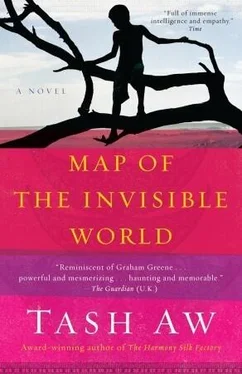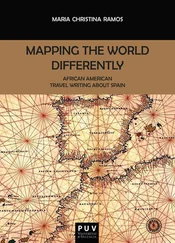Tash Aw - Map of the Invisible World
Здесь есть возможность читать онлайн «Tash Aw - Map of the Invisible World» — ознакомительный отрывок электронной книги совершенно бесплатно, а после прочтения отрывка купить полную версию. В некоторых случаях можно слушать аудио, скачать через торрент в формате fb2 и присутствует краткое содержание. Год выпуска: 2010, Издательство: Spiegel & Grau, Жанр: Современная проза, на английском языке. Описание произведения, (предисловие) а так же отзывы посетителей доступны на портале библиотеки ЛибКат.
- Название:Map of the Invisible World
- Автор:
- Издательство:Spiegel & Grau
- Жанр:
- Год:2010
- ISBN:нет данных
- Рейтинг книги:4 / 5. Голосов: 1
-
Избранное:Добавить в избранное
- Отзывы:
-
Ваша оценка:
- 80
- 1
- 2
- 3
- 4
- 5
Map of the Invisible World: краткое содержание, описание и аннотация
Предлагаем к чтению аннотацию, описание, краткое содержание или предисловие (зависит от того, что написал сам автор книги «Map of the Invisible World»). Если вы не нашли необходимую информацию о книге — напишите в комментариях, мы постараемся отыскать её.
comes an enthralling novel that evokes an exotic yet turbulent place and time—1960s Indonesia during President Sukarno’s drive to purge the country of its colonial past. A page-turning story,
follows the journeys of two brothers and an American woman who are indelibly marked by the past — and swept up in the tides of history.
Map of the Invisible World — читать онлайн ознакомительный отрывок
Ниже представлен текст книги, разбитый по страницам. Система сохранения места последней прочитанной страницы, позволяет с удобством читать онлайн бесплатно книгу «Map of the Invisible World», без необходимости каждый раз заново искать на чём Вы остановились. Поставьте закладку, и сможете в любой момент перейти на страницу, на которой закончили чтение.
Интервал:
Закладка:
“I’m sorry, Bill, I don’t know if I can give you what you want.”
“Of course you can, sweetheart, I’m not asking for much. You’ve done it before.” He leaned across the table and touched her forearm. She expected his hand to be clammy but it was dry and smooth, as it had been twenty years ago.
“It’s different now,” she said. “The students don’t trust me anymore. They don’t respect me.”
“That’s not the Margaret I know. I hope you’re not being deliberately unhelpful.”
“Honestly, Bill. I just — I just don’t have my finger on the pulse anymore.”
“Look, Margaret,” he said, sweeping his hand across his forehead again. His voice changed suddenly, becoming calmer, less cajoling. His fingers began to feel curiously heavy on her arm. “I need names. Commies. That university is a hotbed of activism. I just need to know who the ringleaders are, what they’re planning. You have an ear to the ground. We have these kids just out of grad school sitting in offices analyzing political trends, trying to tell us how the next few months are going to turn out, but it doesn’t count for anything. I have one guy, fluent in standard Indonesian and old-fashioned Javanese, PhD in linguistics, picking apart all of Sukarno’s speeches from the last ten years, looking for clues as to how this guy is thinking, what he’s going to do next — and you know what? We still don’t have a clue. You remember that outburst six months ago, when Dean Rusk announced there was to be no more aid to Indonesia? In every newspaper in the world Sukarno screamed, ‘To hell with your aid.’ This kid wrote a twenty-page report on that one line. Conclusion? Sukarno doesn’t want U.S. aid. Jesus. But you know, Margaret. You hear things. You’re one of us, but it’s like you’re one of them too. How about your colleagues? I hear your research assistant has an interesting background.”
“Din? You’re crazy.”
“I have information, Margaret— intelligence . Something is being planned on that campus, something big. I need to know what it is, and whether it’ll harm our interests.”
“Our interests? What does that mean? For years I reported on the students to you because I thought you wanted to help, because you were new here and you needed information to help this country to help itself. That’s what you said. God, I was stupid. If we hadn’t been … oh, forget it. This is crazy. What sort of intelligence do you have on Din? I just cannot believe he is a danger to anyone.”
“I can’t tell you that, Margaret, but you have to trust me. Please. Just give me whatever you can find out. You might think I’m exaggerating, but your country needs your help. Your people need you. The world’s gone crazy and America needs all the help it can get so that it can help others. And don’t forget that I’m doing all I can to find your friend.”
Margaret did not say anything. A number of witty, cutting responses began to form in her head but faded away quickly. There was really nothing left for her to say.
Bill’s hand was still on her arm. “Call me tomorrow,” he said suddenly, as if some bright memory had reentered his thoughts after a long absence; his fingers tightened slightly around her wrist, pleading rather than threatening. “It’s Sukarno’s big twirl before the cameras of the world. This year’s Independence Day speech is going to be something else. The temperature’s going to be raised quite a few degrees. Let’s listen to it together. I think I can get access to the presidential palace — a friend will fix it for us. Please say yes — it’ll remind me of my first days here, running around town with you. You’ll see all your old contacts, and you never know who might help you.”
Just say no, Margaret thought. She paused. The breathless excitement in Bill’s voice was not genuine, she told herself; he doesn’t care about you, or about the past, or even about himself. This man is an actor, a fake; it’s part of his job.
“Okay,” she said. “I’ll come.”
14
T he poet known as Hanawi, who celebrated the lives of the fishermen and subsistence farmers of Perdo and its neighboring islands, remained unknown during his tragically short lifetime, despite a prodigious literary output over a career that lasted a mere decade before he drowned at age thirty-two. He had taken his little outrigger far out to sea, its gaily painted hull braving the swell of the powerful waves that morning, according to the fragments of hearsay and eyewitness accounts that have since crystallized and become quasi history. He knew these waters well (which schoolboy can forget the immortal lines “And thus the sea is my country/It is my land, my sky/Indeed, it is my blood”?), but that day the skies were exceptionally dark with clouds and everyone knew a bad storm was about to break over Perdo. Most of the other fishing boats came back early, but Hanawi’s did not. The storm lasted two days, and when the waters had calmed the fishermen found his boat washed up on the rocks that circled the western end of the coral reef. Its frail mast had been broken but the sail was curiously intact, floating in the clear, green water. After the storm, the sea was glasslike and flat once more; it was hard to imagine that there had been a storm. It is like this in Perdo: The changes are so absolute, so extreme, that you can never believe anything else exists before or after the very moment in which you find yourself.
The manner of his death no doubt contributed to the image of the romantic poet who lived the authentic life of the masses. In language of extraordinary simplicity, he captured the harshness and beauty of rural life. His verse was free from the conventions of court poetry with its formality and associations with nobility: His voice embodied a sense of freedom and pride that echoed the lives of poor villagers, a sense of liberation and identity that has taken on greater importance in recent times, even (or perhaps particularly) in the cities. Take these lines from his celebrated poem “Hartini,” for example:
When seas are dark, anxious, the quick swell of each wave
lifts the boat quite some way, as light as an arrow.
When you fly, all your tears — yes, tears — are for now, save
the few which may, just may, be shed for tomorrow.
When the catch is bounteous, on those rare fine bright days,
the mackerel seem to play, spinning a small rainbow.
You notice her eyes: fierce, yet lost, too, in a haze.
Come back, you want to say. Come back from your sorrow.
Can you hear that it is a double pantun? Hanawi uses this traditional everyday form in new and playful ways, tweaking it, making it seem casual and more modern — but none of this is really relevant. What is important is that even illiterate villagers can relate to the rhythms of this style. We grew up with it, our ears are tuned to it. And so, in a funny way, it means something to us all. We feel what it is to be one people, free in our own country.
Does it matter, then, to find out that Hanawi was not, in fact, born on one of these remote islands but into a prosperous family of Chinese immigrants in Malang? He did not grow up speaking the coarse dialect of Perdo with its dull vowels and overemphasized consonants, but Javanese of a very stately variety, in addition to what was to become standard Indonesian and, of course, Dutch, educated as he was at the Hoogere Inland School. At home his family spoke Teochew, the language of his forefathers who had emigrated from southern China midway through the nineteenth century. It is true that he shunned the trappings of sophisticated Javanese life in favor of a simple existence in the islands, but he was able to do so because of the wealth and generosity of his family. He wrote ode after ode to the lives of fishermen but did not himself work as one; in fact, he never worked at all. Do you think this affects the authenticity of his voice? Does this change the way we read his work? When political leaders quote lines of his to show how in touch they are with the lives of ordinary folk, should we be moved, or simply howl with derision?
Читать дальшеИнтервал:
Закладка:
Похожие книги на «Map of the Invisible World»
Представляем Вашему вниманию похожие книги на «Map of the Invisible World» списком для выбора. Мы отобрали схожую по названию и смыслу литературу в надежде предоставить читателям больше вариантов отыскать новые, интересные, ещё непрочитанные произведения.
Обсуждение, отзывы о книге «Map of the Invisible World» и просто собственные мнения читателей. Оставьте ваши комментарии, напишите, что Вы думаете о произведении, его смысле или главных героях. Укажите что конкретно понравилось, а что нет, и почему Вы так считаете.












